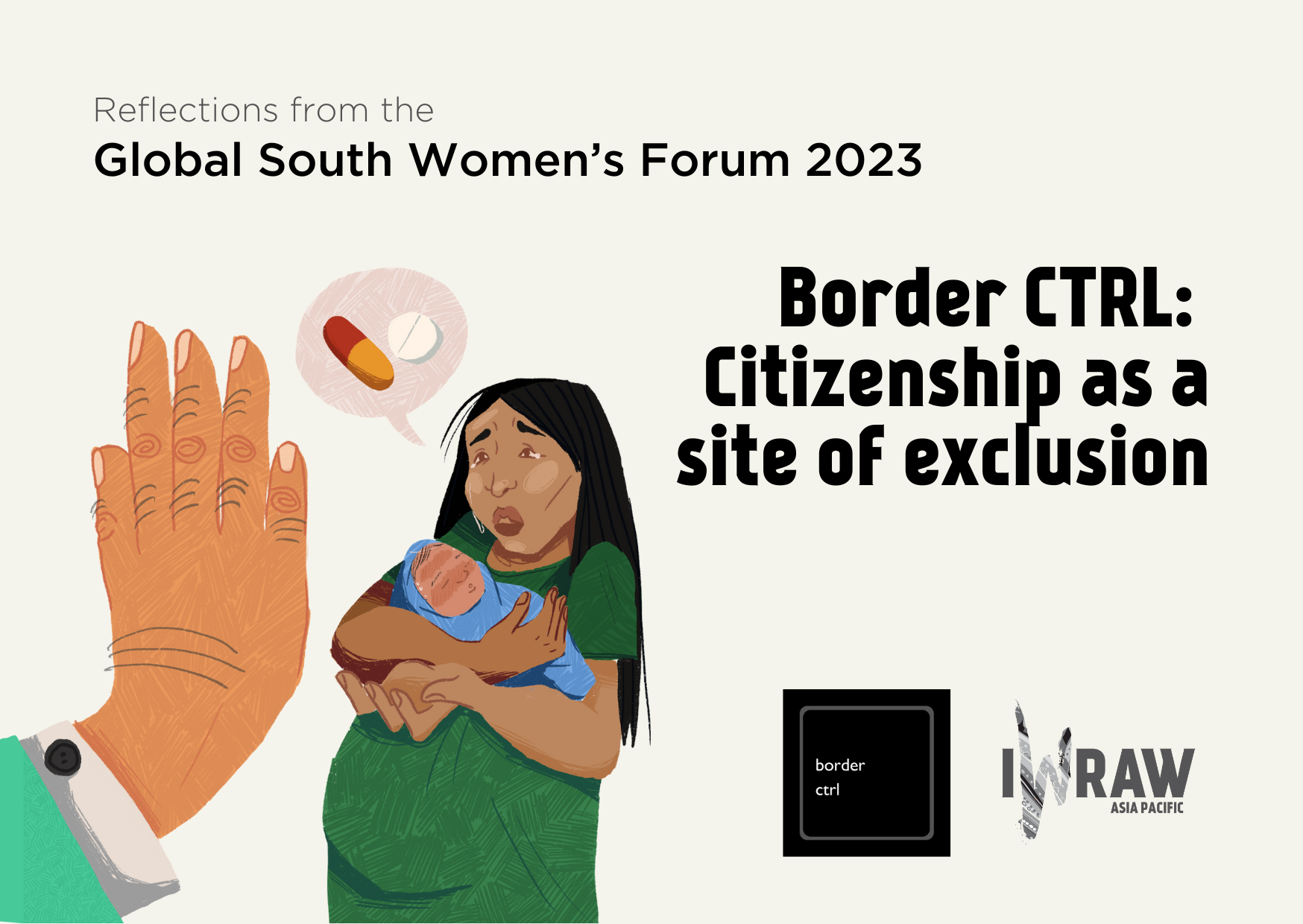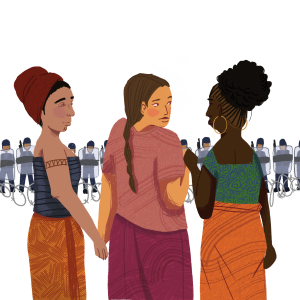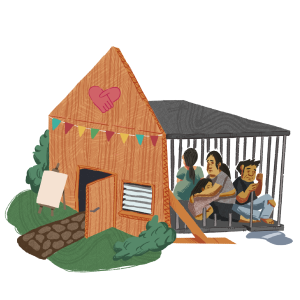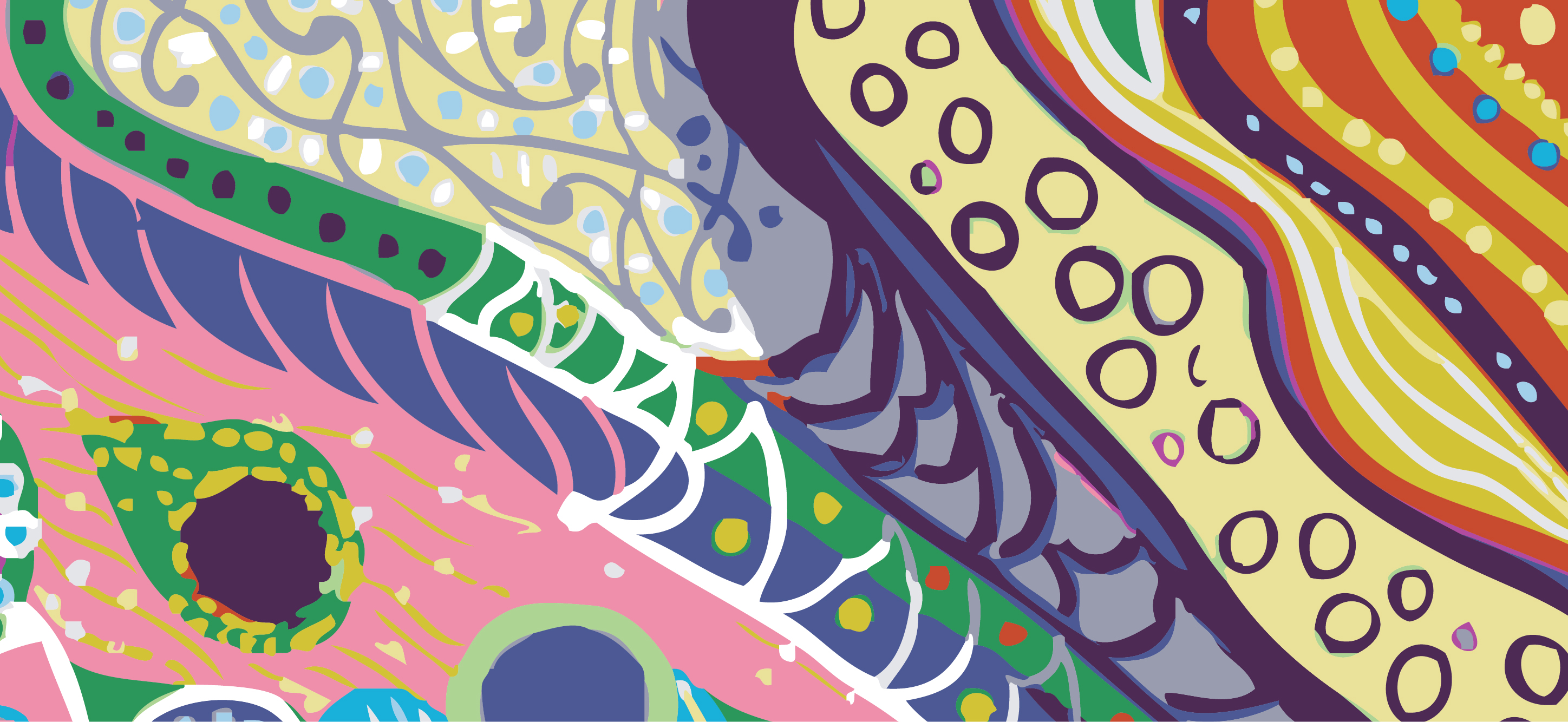
Concluding this series on the Global South Women’s Forum (GSWF) 2023, we explore the theme of citizenship as a site of exclusion. This final instalment provides a snapshot of the diverse and often challenging experiences of women from and across the Global South as they navigate discriminatory nationality laws and visa regimes. The discussions were rich with personal testimonies and expert insights into systemic barriers, revealing how immigration and nationality laws are not just administrative measures but powerful tools that govern whether individuals have access to the full spectrum of rights and opportunities.

Illustration by Appolonia Tesera for GSWF 2023
Throughout the sessions, speakers from different countries highlighted the systemic barriers and pervasive inequalities within border-related policies and laws which often perpetuate rather than alleviate gender disparities, making it harder for women to access their rights.
Of significant concern were the barriers in numerous countries where it is disproportionately difficult for women married to foreigners to pass citizenship to their spouses or children. This issue became even more pronounced during the pandemic, when arbitrary, nationality-based restrictions prevented women from returning to their home countries, despite being citizens, simply because their non-citizen family members were barred from accompanying them.
In Malaysia, some progress towards constitutional amendments to grant women equal citizenship rights has been offset by regressive proposals. Recent legislative efforts to allow Malaysian women to pass their nationality to their children born abroad to foreign fathers may come at the expense of thousands of stateless people whose chances of acquiring citizenship may be completely closed off. Although the government has shown some willingness to amend the constitution for gender equality, this has seen pushback from certain political and religious groups. Similarly, in Eswatini, women who marry foreigners cannot pass on citizenship to their children, reinforcing discrimination based on gender. Most signatories in the House of Parliament cite cultural and traditional norms, arguing that it is not proper for women in Eswatini culture to confer citizenship to foreign men or children. As Lindiwe Khumalo highlighted, “These cultural barriers are not just legal but deeply personal and social, making them even more challenging to dismantle.”

Illustration by Appolonia Tesera for GSWF 2023
Speakers from Mexico shared the struggles of returnee women whose foreign-born children were unable to access their basic right to citizenship despite its guarantee in the constitution. “In Mexico,” explained Itzel Polo Mendieta, “we always say we have wonderful laws, but they are written in dead letters because no authorities implement them.” She described her organisation CAFAMI’s struggle against the requirement of an apostille stamp on birth certificates, which was virtually impossible for families to obtain from the US following deportation. This had blocked children’s access to healthcare and education, and in later life would block their access to employment, too. After eight years, CAFAMI achieved its goal in the state of Tlaxcala in July 2023; however, Itzel was intent on securing the same victory nationwide, as well as addressing similar obstacles in El Salvador, Guatemala and Honduras.
‘The Majority Minority’, a session organised by Migrant-Rights.org, addressed the exclusion of non-citizens in the Gulf countries where migrant workers comprise the majority of the population. Facilitator Ali Mohamed explained, “Migrant workers [are] considered permanently temporary and excluded from the main social protection rights in the region, which tend to be citizenship-based.” The gendered dimensions of this were vividly illustrated by speaker Sana Quadri, a non-citizen of the United Arab Emirates who was born and raised in Dubai but whose right to remain hinged on sponsorship by her father or by her employer: “Either we are property of our fathers or our husbands, or just a plain corporate slave.” In such circumstances, dependency for visas can place power into the hands of not only abusive employers but also abusive families.
“I cannot tell all our challenges. If I tell all the stories, it takes a full day or more.” This was how Teresita Diego, vice chair of the first domestic workers’ union in the Gulf, concluded her description of difficulties faced by migrant workers in Bahrain. Despite racism, sexism, excessive working hours, delays in payment and denials of payment, those who leave their jobs risk being fined and deported. These injustices – and worse – were echoed in a screening of On the Go: The Dark Side of Labour Externalization, which described the violence and exploitation experienced by Ugandans in the same region.
Also discussed was the vulnerable position of Palestinian, Syrian and Sudanese refugees living in the Gulf: a lack of refugee or asylum rights, and an awareness of their perpetual deportability, leads them to move on to countries such as Sweden. However, such destination countries have been known to reject their asylum claims due to a lack of understanding of the Gulf context and an assumption that they could have stayed there indefinitely. Meanwhile, some of those who do secure asylum overseas subsequently return to the Gulf, motivated by family ties, historical connection and the improved quality of life afforded by their new Global North passports. Discrimination in the country of their newly acquired citizenship serves as another push factor. The years of precarity and instability required just to return to their long-term home, simply due to the Gulf region’s lack of recognition of refugees and other non-citizens, is striking.
Nadeen Dakkak, a Syrian born and raised in Kuwait but now living in the UK, described the social and cultural loss incurred by countries that engage in such exclusionary practices: “I know how it feels to want to contribute and feel that there is no scope for your contribution.” And in stark contrast, golden visas and golden passports present a workaround, making security available only to those with substantial wealth. As Sana Quadri observed, “it is definitely not meant for us long-timers or people who have actually spent decades oiling the economy of the countries.”
The combined stories of exclusion based on lack of citizenship, and barriers to obtaining citizenship, lead us to advocate not only for reforms but for a world in which citizenship has no bearing on the rights that people enjoy. Nobody should be denied healthcare, housing, safety, education, employment, a family life or the right to live in the place they call home: this should be fundamental, rather than something decided by bureaucratic processes. As long as inequality is built into the concept of citizenship, nationality rights are not enough.
Olga Septemba is a passionate human rights practitioner and feminist, dedicated to advocating for marginalised communities, particularly those affected by forced migration. With extensive experience in addressing sexual and gender-based violence, she has worked to support individuals facing discrimination, displacement, and disability in Uganda, always striving to ensure protection and dignity. Grounded in intersectionality, Olga’s approach addresses the complex challenges faced by migrant populations. Through her Interrogating Borders fellowship with IWRAW Asia Pacific, she organised convenings for women affected by border-related marginalisation, shaping advocacy priorities, expanding networks of peacebuilders, and fostering intergenerational collaboration.
Nine leads IWRAW Asia Pacific’s programme Interrogating Borders and their Impact on Women’s Human Rights. She is driven by an interest in the necropolitics of bordering practices, and the intersections of oppression and privilege which influence the outcomes of migration journeys. As co-founder of Garabtaag, she coordinates grassroots assistance to refugees in Malaysia; and as a new migrant in Malta, she is a member of Malta LGBTIQ+ Rights Movement (MGRM)’s working group on asylum and migration.

